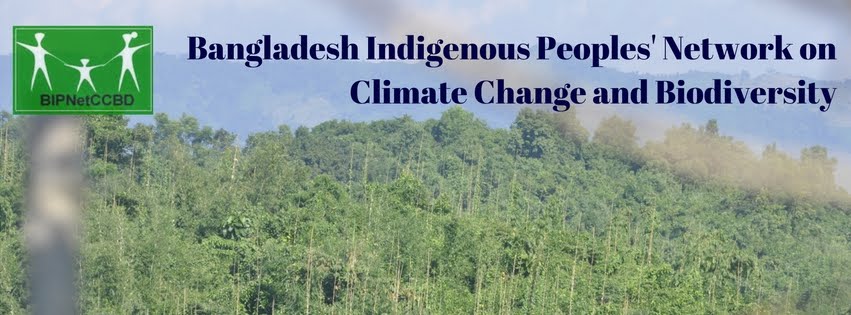Monday, March 19, 2012
Friday, March 9, 2012
Objectives of BIPNetCCBD
Some core objectives of BIPNet-CCBD:
a) To ensure the full and effective participation of the representatives of indigenous peoples at national and international policy-level meetings on climate change and environment issues.
a) To ensure the full and effective participation of the representatives of indigenous peoples at national and international policy-level meetings on climate change and environment issues.
b) To lobby the concerned government agencies/departments to account for and provide due regard to the traditional knowledge of indigenous peoples.
c) To ensure the inclusion of indigenous representatives in State delegations and obtain support of the government for Indigenous Peoples’ concerns on climate change.
d) To establish mechanisms for the engagement of relevant government agencies with Indigenous Peoples and other stakeholders at the national level, and to address the concerns of Indigenous Peoples.
Background of BIPNetCCBD
Around the globe, the indigenous peoples are among the first to face the direct consequences of climate change, due to their dependence upon, and close relationship with, the environment and its resources. Climate change exacerbates the difficulties already faced by indigenous communities, including political and economic marginalization, loss of land and resources, human rights violations, discrimination and unemployment. Against this backdrop, Bangladesh Indigenous Peoples’ Network on Climate Change and Biodiversity” (BIPNet-CCBD) came into being in a seminar organized by Maleya Foundation in Dhaka on 14 November 2009. There are some 18 organizations of indigenous peoples in Bangladesh that are members of this network: BIPNet-CCBD.
The Bangladesh Indigenous Peoples Network on Climate Change and Biodiversity (BIPNet-CCBD) was founded in 2009 by a group of concerned indigenous organizations of the Bangladesh (Chittagong Hill Tracts and Plain Land). The
Bangladesh Indigenous Peoples Network on Climate Change and Biodiversity (BIPNet-CCBD) was established to sharing Climate Change and Biodiversity, such as rural communities, local NGOs, community-based organizations, people’s organizations and mass-based organizations, among others.
Maleya Foundation is the secretariat of this network. In recognition of its commitment to the campaign of climate change, BIPNet-CCBD, within a short span of time after its inception, was granted full membership to the IPCCSD (Indigenous Peoples' Global Network on Climate Change and Sustainable Development) in 2010.
BIPNet-CCBD Member List
- Movement for the protection of Forest and Land Rights in the Chittagong Hill Tracts
- Greater Sylhet Indigenous Peoples’ Forum, Shreemongal
- Joyenshahi Adivasi Unnaya Parishad, Moulovibazer, Sylhet
- Bhaual Adivasi Jote, Gazipur
- Mro Social Council, Bandarban
- Wickliffe Siem Jubo Songha Sunamgonj
- Zabarang Kalyan Samity (ZKS), Khgarachari
- Maleya Foundation, Dhaka
- Adivasi Sahitto and Sangskritik Parishad, Gazipur
- Trinamul Unnayan Sangstha, Khagrachari
- Hilly Homes, Bandarban
- Patra Sampradai Kalyan Parishad, Syleht
- Khagrapur Mahila Kalyan Samity (KMKS), Kharachari
- Taungya, Rangamati
- Jatiya Adibashi Parishad (JAP), Dinajpur
- Adibashi Samaj Unnayan Songstha, Dinajpur
- Srategic Action Society (SAS), Rangamati
- Humanitarian Foundation, Bandarban
- Kabidang, Khagrachari
- Rakhayin Samaj Unnoyon Songstha, Barguna
Observer Member
- Adibasi Sangkritik Unnyan Songstha (ASUS), Rajsahi
- Bangladesh Resource Centre forIndigenous Knowledge (BARCIK), Dhaka
- Bangladesh Adivasi Nari O Sisu Kalyan Songstha, Dinajpur
Subscribe to:
Posts (Atom)


